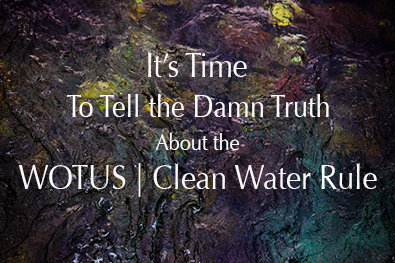Had an interesting discussion with friend and mentor Ed last night. We’ve shared quite a bit about Ed; he’s a fiercely independent, under the radar, up from the bootstraps, now-quite-well-off guy who has a penchant for simple food, simple living, preserving rivers and wilderness, fly fishing and Montana.
He called in a huff and said he’d been receiving “emails all damned day” from a number of outdoor advocacy organizations he supports financially, in his words “spewing the same bullsh*t about ‘voting the environment’”.
Ed’s analysis and subsequent advice, offered in condensed version here, was (as usual when he’s on a roll) worth sharing; I jotted a few notes after getting off the phone. Not everybody will appreciate what Ed had to say; that’s fine, this is about sharing an interesting opinion from an old friend.
Ed’s Point #1: Politically, in terms of ‘managing the country, most seem to agree things are a mess.
Ed’s always been a numbers and data guy and insists that careful analysis, as opposed to ‘going with my gut’ and emotion, is one of the cornerstones of his success. Therefore I was not surprised when he referenced these current points: Congressional approval is near all time lows, Presidential approval ratings are dismal and fully two-thirds polled think the country is on the wrong track (astutely noting those numbers can’t arise from just one political party).
Interestingly Ed suggested the level of frustration palpable in the country seems to be higher than he remembers ever in his 80+ (that’s my guess on age) years.
Ed’s Point #2: Single issue voters are going about it all wrong.
Here’s where it got a bit more interesting. Ed argued a strong case that single issue voters – i.e., ‘Vote the Environment’ are “missing the greatest opportunity to get things right in a generation or two”.
His premise was rather simple – we don’t live in a single issue country or world these days.
His bone to pick was actually with Patagonia, and actually had me go read this on their Vote the Environment site –
Patagonia wants to be in business for a long time and a healthy planet is necessary for a healthy business. We want to act responsibly, live within our means, and leave behind a planet we would want to live in. We need leaders who are committed to this vision. That’s our stake in the midterm elections.
Ed’s pitch surprised me a bit; he insisted their ‘mission statement’ espoused in that paragraph is a great one and worthy of embracing – particularly the objective to ‘live within our means and leave behind a planet worth living in’.
His counterpoint worth pondering: Patagonia is calling for leaders (and for you to elect them) to adopt their vision in managing the country, yet they clamor for policies that obviate the ‘live within our means’ tenant continually.
His example principally focused on the vilification of ‘big oil’ and big, bad coal’; Ed went on to suggest that energy issues can be boiled down to simple physics and math.
Ed’s Point #3: Vote the Math. (And the Big Picture.)
Ed suggested that as a prime example look at energy.
He said the use of fossil fuels has notable environment consequences, however, there’s no escaping the fact that a unit of GDP (economic production) in all countries is tied inexorably to a unit of energy. (Ed noted that’s why coal use is soaring in the BRICS and other developing countries – it’s relatively cheap.)
Ed went on this way – want to kill coal and curtail the use of evil oil products? Fine, do it, though show how you’re going to replace relatively cheap energy with similarly relatively cheap sustainable energy that meets current demand and growth patterns in a healthy, sustainable economy. Wind and solar can’t come close (there’s that pesky math issue again) right now; Ed is convinced LFTRs are the answer (an interesting discussion for another day perhaps).
He even went on to say politicians – and advocacy groups – should have to ‘show their math’ – meaning address the big picture ramifications of their recommendations – just like those of us educated in the old days had to in school.
The issue (the energy example) then becomes predominantly one of the physics of energy and pretty damned simple math, not just plucking at emotional heart strings with catchy slogans (which Ed probably correctly argues serve the primary purpose of fund raising, at least some of which in the end is spent as ‘dirty money’ in the political game).
The coup de grace of Ed’s angle was you might obscure the math for a while, but the reality of the numbers always comes home to bite sooner or later.
We agreed that the challenge of course becomes actually finding candidates (and/or parties) with actual fact- and reality-based programming – much more of challenge today than it should be. Ed is convinced that rational, reality-based minds will eventually win the day and that sanity will be restored in our country’s leadership. I’m not so sure, but remain hopeful.
In the meantime, Ed’s right, get out there and vote today.

